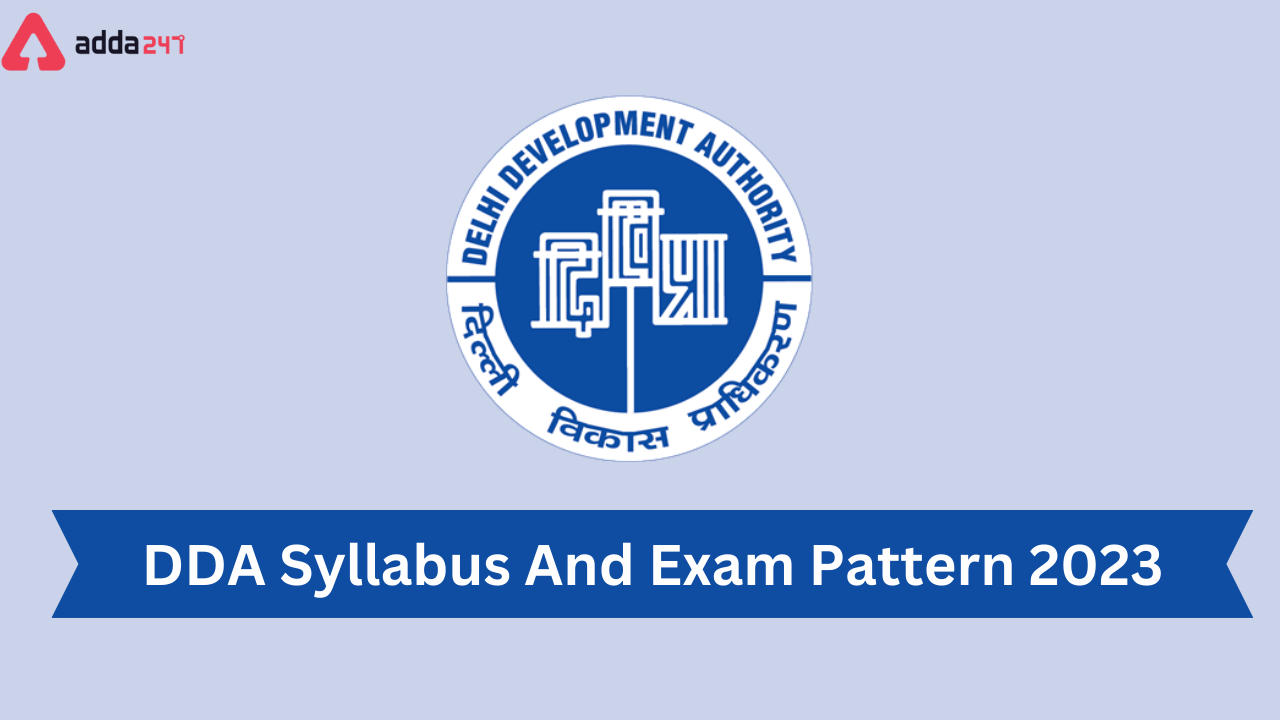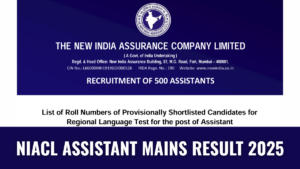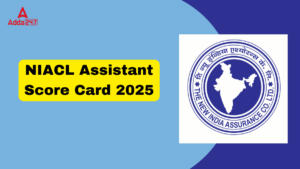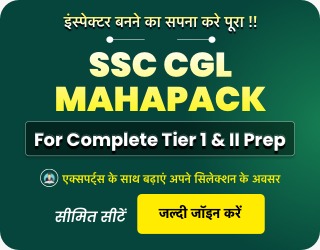Table of Contents
DDA Syllabus 2023
DDA Syllabus 2023: On the official website, the Delhi Development Authority (DDA) has posted the DDA Syllabus 2023 along with the official advertisement for DDA Recruitment 2023 that seeks to hire a total of 687 candidates for various positions. Candidates who qualify for the positions of Assistant Accounts Officer, Assistant Section Officer, Legal Assistant, Patwari, and other positions should take advantage of this excellent opportunity. The DDA Exam Date 2023 is between the 1st of August and the last day of September, according to the short notice that was published. Candidates who are interested in this recruitment should start preparing from now only. Check the DDA Syllabus 2023 below.
DDA Syllabus
DDA Syllabus 2023: Understanding the DDA Syllabus prior to preparation gives you a roadmap, enables you to effectively allocate your time and resources, and enables you to concentrate on the most crucial topics. Ensuring you cover all pertinent material and go into the exam with confidence, increases your chances of success. To aid in their preparation, candidates must read the DDA Syllabus 2023 provided here.
DDA Syllabus 2023: Overview
The candidates can find the details of the DDA Syllabus 2023 in the overview table below:
|
DDA Syllabus 2023 |
|
| Organization | Delhi Development Authority |
| Posts | Grade B and Grade C |
| Vacancy | 687 |
| Category | Syllabus |
| Mode of Application | Online |
| Detailed Notification | 26th May 2023 |
| Application Dates | 3rd June 2023 to 2nd July 2023 |
| Exam Dates | 1st August 2023 to 30th September 2023 (1st Stage) |
| Official Website | dda.gov.in |
DDA Syllabus 2023: Exam Pattern
Depending on the position, the DDA Exam Pattern may change. The exam schedule for various positions is listed below. Candidates can review it based on the position they are applying for. The DDA Exam Pattern and Syllabus will be updated once a thorough official announcement has been made.
| DDA Exam Pattern 2023 Assistant Section Officer | ||||
| STAGE 1 (Preliminary) | ||||
| Sl.No | Subject | No. Of Questions | Marks | Duration |
| 1. | General Intelligence and Reasoning | 100 | 200 | 1 Hour |
| 2. | Quantitative Aptitude | |||
| 3. | General Awareness | |||
| 4. | English Comprehension | |||
| Stage 2 (Mains) | |||||
| Session | Section | Subject | No. Of Question | Marks | Duration |
| I
(02 Hours and 15 Minutes) |
I | Module I-
Mathematical Abilities |
30 Questions | 90 Marks | 1 Hour |
| Module II-
Reasoning & General Intelligence |
30 Questions | 90 Marks | |||
| II | Module I-
English Language and Comprehension Module II- General Awareness |
45 Questions | 135 Marks | 1 Hour | |
| 27 Questions | 75 Marks | ||||
| III | Computer
Knowledge |
20 Questions | 60 Marks | 15 minutes | |
| II
(15 Minutes) |
IV | Data Entry Speed
Test (Qualifying in nature) |
One Data Entry
Task |
15 minutes | |
|
DDA Exam Pattern 2023 Assistant Accounts Officer |
||||
| Sl. No | Subject | No. Of Questions | Marks | Duration |
| 1. | Reasoning | 120 Questions | 120 Marks | 2 Hours |
| 2. | Quantitative Aptitude | |||
| 3. | General Awareness | |||
| 4. | English language | |||
| 5. | Respective Discipline | |||
| Interview | ||||
|
DDA Exam Pattern 2023 Architectural Assistant, Legal Assistant, Naib Tehsildar, Junior Engineer (Civil) & Surveyor |
||||
| Sl No. | Subject | No. Of Questions | Marks | Duration |
| 1. | Reasoning | 120 Questions | 120 Marks | 2 Hours |
| 2. | Quantitative Aptitude | |||
| 3. | General Awareness | |||
| 4. | English language | |||
| 5. | Respective Discipline | |||
|
DDA Exam Pattern 2023 For Patwari |
||||
| STAGE 1 (Preliminary) | ||||
| Sl No. | Subject | No. Of Questions | Marks | Duration |
| 1. | General Awareness | 120 Questions | 120 Marks | 2 Hours |
| 2. | General Intelligence & Reasoning Ability | |||
| 3. | Arithmetical & Numerical Ability | |||
| 4. | Hindi & English | |||
| 5. | Basic Computer knowledge | |||
| STAGE 2 (Mains) | ||||
| 1. | General Awareness (Special Emphasis on
Delhi) |
200 Questions | 200 Marks | 2 Hours |
| 2. | General Intelligence & Reasoning Ability | |||
| 3. | Arithmetical & Numerical Ability | |||
| 4. | English Language & comprehension | |||
| 5. | Hindi or Urdu language and comprehension | |||
| 6. | Basic Computer knowledge | |||
|
DDA Exam Pattern 2023 Junior Secretariat Assistant |
||||
| STAGE 1 (Preliminary) | ||||
| Sl. No. | Subject | No. Of Questions | Marks | Duration |
| 1. | General Intelligence and Reasoning | 100 Questions | 200 Marks | 19 Hours |
| 2. | Quantitative Aptitude | |||
| 3. | General Awareness | |||
| 4. | English language | |||
| Stage 2 (Mains) | |||||
| Session | Section | Subject | No. Of Question | Marks | Duration |
| I
(02 Hours and 15 Minutes) |
I | Module I-
Mathematical Abilities |
30 Questions | 90 Marks | 1 Hour |
| Module II-
Reasoning & General Intelligence |
30 Questions | 90 Marks | |||
| II | Module I-
English Language and Comprehension Module II- General Awareness |
40 Questions | 120 Marks | 1 Hour | |
| 20 Questions | 60 Marks | ||||
| III | Computer
Knowledge |
15 Questions | 45 Marks | 15 minutes | |
| II
(10 Minutes) |
IV | Skill Test/Typing Test
(Mandatory but Qualifying in nature) |
Typing Test for
JSA. |
10 minutes | |
DDA Syllabus 2023: Post Wise
The DDA Syllabus 2023 is provided here in accordance with the position described in the official notification pdf. Candidates must review the information provided here.
Post: Assistant Accounts Officer
|
Parts |
Syllabus |
| Part-I | : Based on advanced knowledge of the Academic field
Financial Analysis of Balance Sheet and Income Statement Capital Budgeting decisions (Risk and Return analysis, Sensitivity analysis, Capital rationing, adjusted net Present value, Replacement decision, Impact of inflation on capital budgeting decision, etc.) Rebate, Relief, and refunds under provisions of Income Tax. |
| Part-II | Reasoning
Quantitative Aptitude General Awareness and English Language |
Post: Assistant Section Officer
| Stage | Syllabus |
| Stage I | a) General Intelligence & Reasoning: Analogies, similarities and differences, space visualization, spatial orientation, problem-solving, analysis, judgment, decision-making, visual memory, discrimination, observation, relationship concepts, arithmetical reasoning, and figural classification, arithmetic number series, non-verbal series, coding and decoding, statement conclusion, syllogistic reasoning, etc. The topics are Semantic Analogy, Symbolic/Number Analogy, Figural Analogy, Semantic Classification, Symbolic/Number Classification, Figural Classification, Semantic Series, Number Series, Figural Series, Problem Solving, Word Building, Coding & de-coding, Numerical Operations, symbolic Operations, Trends, Space Orientation, Space Visualization, Venn Diagrams, Drawing inferences, Punched hole/ pattern- folding& un-folding, Figural Pattern-folding and completion, Indexing, Address matching, Date & city matching, Classification of center codes/roll numbers, Small & Capital letters/numbers coding, decoding and classification, Embedded Figures, Critical thinking, Emotional Intelligence, Social Intelligence.
b) General Awareness: Questions in this component will be aimed at testing the candidates’ general awareness of the environment around them and its application to society. Questions will also be designed to test knowledge of current events and of such matters of everyday observations and experience in their scientific aspect as may be expected of any educated person. The test will also include questions relating to India and its neighboring countries, especially pertaining to History, Culture, Geography, Economic Scene, General Policy & Scientific Research c) Quantitative Aptitude: The questions will be designed to test the ability of appropriately use of numbers and number sense of the candidate. The scope of the test will be the computation of whole numbers, decimals, fractions, and relationships between numbers, Percentages. Ratio & Proportion, Square roots, Averages, Interest, Profit and Loss, Discount, Partnership Business, Mixture, and Allegation, Time and distance, Time & Work, Basic algebraic identities of School Algebra & Elementary surds, Graphs of Linear Equations, Triangle and its various kinds of centers, Congruence and similarity of triangles, Circle and its chords, tangents, angles subtended by chords of a circle, common tangents to two or more circles, Triangle, Quadrilaterals, Regular Polygons, Circle, Right Prism, Right Circular Cone, Right Circular Cylinder, Sphere, Hemispheres, Rectangular Parallelepiped, Regular Right Pyramid with triangular or square base, Trigonometric ratio, Degree and Radian Measures, Standard Identities, Complementary angles, Heights and Distances, Histogram, Frequency polygon, Bar diagram & Pie chart d) English Comprehension: Candidates’ ability to understand correct English, their basic comprehension and writing ability, etc. would be tested. The questions in Parts a), b), & d) will be of a level commensurate with the essential qualification viz. Graduation and questions in Part – c) will be of the 10th standard level. |
Post: Surveyor
| Parts | Syllabus |
| Part-I | Occupational safety & health, PPE, etc. Basic drawing (consisting of lettering, numbering, a geometrical figure, symbols & representations). Drawing of different scales, and projections, performing site survey and preparing a site plan using chain/tape, prismatic compass, performing AutoCAD drawing. Observation of all safety aspects is mandatory. Safety components like OSH&E, PPE, Fire extinguisher, First Aid, etc. Knowledge of creating drawing using toolbars, commands, and menus.Plotting drawing from CAD |
| Basic knowledge of Different site surveys using a Plane table (radiation, intersection, traversing, determination of height), Theodolite (measurement of angle, traversing, computation of area), tachometer (determination of horizontal and vertical distance, constants, etc.) Advanced knowledge of site survey using leveling instruments (different leveling – differential, reciprocal, etc.) field book entry, plotting, mapping, calculation of area, preparing traverse drawing, and simple building drawing using CAD | |
| Topographical map using Level instruments with contours (Interpolation of contour, preparation of section, computation of volume, setting of the simple, compound, reverse, transition, and vertical curve), performing survey using Total Station and preparation of map (measurement of angle, coordinates, and heights, downloading survey data and plotting), making of a site plan by Cadastral survey (preparation of site plan, calculation of plot area, etc.), performing road project survey (location survey and preparation of route map, profile/longitudinal/cross-sectional leveling, and plotting) and survey drawing using CAD. | |
| Drawing of cartographic projection, setting, and application of GIS & GPS techniques in various fields, collection, and processing of data, performing hydrographic survey (determining hydrographic depth, measuring the velocity of flow, determining the cross-sectional area of the river, calculating the discharge of a river, etc.). Basic knowledge about performing transmission line site survey (making of alignment, conducting a detailed survey, final location survey, and making of tower foundation pit point), performing railway line site survey, drawing of building by CAD and preparation of estimation, etc. | |
| Demonstrate knowledge of concepts and principles of basic arithmetic, algebraic, trigonometric, statistics, and coordinate systems and apply knowledge of the specific areas to perform practical operations | |
| Part-II | Reasoning
Quantitative Aptitude General Awareness and English Language |
Post: Patwari
| Parts | Syllabus |
| Stage I (Preliminary) | General awareness: The candidate’s general awareness of his or her surroundings and how it relates to society will be put to the test through a series of questions. The questions will be made to test your knowledge of current events and other topics that an educated person might be expected to be familiar with. Additionally, the test will cover topics like history, politics, the Constitution, sports, art and culture, geography, economics, common science, scientific research, national and international organizations, etc. |
| General Intelligence & Reasoning Ability: Both verbal and nonverbal questions are included in the General Intelligence & Reasoning Ability syllabus. Analogies, similarities, differences, spatial perception, problem-solving, analysis, judgment, decision-making, visual memory, discrimination, observation, relationship, concepts, mathematical reasoning, verbal and figure classification, mathematical number series, and other topics may be covered on the test. | |
| Mathematical Ability: The test of mathematical and numerical abilities will cover number systems, including questions on simplification, decimals, fractions, LCM, HCF, ratio & proportion, percent, average, profit & loss, discount, simple & compound interest, menstruation, time & work, time & distance, tables & graphs, etc. of the tenth level. | |
| Hindi language and comprehension as well as English language and comprehension will be tested, along with the candidate’s knowledge of their respective languages’ vocabulary, grammar, sentence structure, synonyms, antonyms, and proper usage, among other topics. Ability to reason. | |
| Basic computer knowledge: Computer Organisation: RAM, ROM, File System, Input Devices, Operating System, MS Office (Exposure of Word, Excel/Spreadsheet, Powerpoint), Information Technology and Society: Indian IT Act, Digital Signatures, Application of Information Technology in Government for E-Government, mobile/Smartphones, Information Kiosks | |
| Stage II | General Awareness – General awareness with special emphasis on the History, Culture, Demography, Geography & Economy of Delhi, Administrative set up and Governance in the NCT of Delhi |
| General Intelligence & Reasoning Ability: Both verbal and nonverbal questions are included in the General Intelligence & Reasoning Ability syllabus. Analogies, similarities, differences, spatial perception, problem-solving, analysis, judgment, decision-making, visual memory, discrimination, observation, relationship, concepts, arithmetical reasoning, verbal and figure classification, arithmetical number series, and other topics may be covered in tests | |
| Mathematical Ability: The test of mathematical and numerical abilities will cover number systems, including questions on simplification, decimals, fractions, LCM, HCF, ratio & proportion, percent, average, profit & loss, discount, simple & compound interest, menstruation, time & work, time & distance, tables & graphs, etc. of the tenth level. | |
| Hindi language and comprehension as well as English language and comprehension will be tested, along with the candidate’s knowledge of their respective languages’ vocabulary, grammar, sentence structure, synonyms, antonyms, and proper usage, among other topics. Thinking Skills. | |
| Information Technology and Society: Indian IT Act, Digital Signatures, Application of Information Technology in Government for E-Government, Mobile/Smartphones, Information Kiosks, Characteristics of Computers, Computer Organisation including RAM, ROM, File System, Input Devices, Computer Software-Relationship between Hardware and Software, Operating System, |
Post: Junior Secretariat Assistant
| Parts | Syllabus |
| Stage I (Preliminary) | General Intelligence & Reasoning: Analogies, similarities and differences, space visualization, spatial orientation, problem-solving, analysis, judgment, decision-making, visual memory, discrimination, observation, relationship concepts, arithmetical reasoning, and figural classification, arithmetic number series, non-verbal series, coding and decoding, statement conclusion, syllogistic reasoning, etc. The topics are, Semantic Analogy, Symbolic/Number Analogy, Figural Analogy, Semantic Classification, Symbolic/Number Classification, Figural Classification, Semantic Series, Number Series, Figural Series, Problem Solving, Word Building, Coding & de-coding, Numerical Operations, symbolic Operations, Trends, Space Orientation, Space Visualization, Venn Diagrams, Drawing inferences, Punched hole/pattern–folding & un-folding, Figural Pattern– folding and completion, Indexing, Address matching, Date & city matching, Classification of center codes/roll numbers, Small & Capital letters/numbers coding, decoding and classification, Embedded Figures, Critical thinking, Emotional Intelligence, Social Intelligence, Other sub-topics, if any…. Read more at: https://www.sscadda.com/dda-syllabus-2023/ |
| General Awareness: Questions in this component will be aimed at testing the candidate’s general awareness of the environment around him and its application to society. Questions will also be designed to test knowledge of current events and such matters of everyday observations and experience in their scientific aspect as may be expected of any educated person. The test will also include questions relating to India and its neighboring countries, especially about History, Culture, Geography, Economic Scene, General Policy & Scientific Research | |
| Quantitative Aptitude: The candidate’s capacity for appropriate use of numbers and number sense will be tested by the questions. The computation of whole numbers, decimals, fractions, and relationships between numbers as well as percentages will be covered by the test. proportional reasoning, Averages, Interest, Profit and Loss, Square Roots Discount, Collaboration Business, Blend, and Accusation Distance and time, time and work, school algebra’s foundational algebraic identities Linear Equation Graphs, Triangles and their different center types, triangles’ congruence and similarity, a circle’s chords, tangents, and angles that they subtend, as well as common tangents between two or more circles, Heights and distances, quadrilaterals, triangles, Pie chart, bar graph, and histogram. | |
| English Language & Comprehension: Questions in this component will be based on spotting the error, filling in the blanks, synonyms, antonyms, spelling/detection of misspelled words, idioms & phrases, one-word substitution, improvement of sentences, active/passive voice of verbs, conversion into direct/indirect narration, shuffling of sentence parts, shuffling of sentences in a paragraph, and shuffling of sentences in a passage. | |
| Stage II | Computer Proficiency Test (CPT): The question paper shall be 50 minutes duration of 100 marks consisting of 50 questions of objective type (Multiple Choice Questions) as per the detail given below:
Computer Fundamental Section (10 questions), 2 marks per question Keyboard Shortcut key & Internet (10 questions), 2 marks per question MS Word (10 questions), 2 marks per question MS Excel (10 questions), 2 marks per question MS PowerPoint (10 questions), 2 marks per question |
DDA Syllabus 2023 PDF
Candidates can download the DDA Syllabus 2023 PDF from the direct link shared below. A printout of the DDA Syllabus 2023 PDF will help the candidates to streamline their preparation. Download the DDA Syllabus PDF 2023 here.
Download DDA Syllabus 2023 PDF
Also, Read
| DDA 2023 Articles | |
| DDA Recruitment 2023 | DDA Salary 2023 |



 NIACL Assistant Mains Result 2025 Out, D...
NIACL Assistant Mains Result 2025 Out, D...
 NIACL Assistant Mains Score Card 2025, C...
NIACL Assistant Mains Score Card 2025, C...
 NIACL Assistant Mains Cut Off 2025, Stat...
NIACL Assistant Mains Cut Off 2025, Stat...




